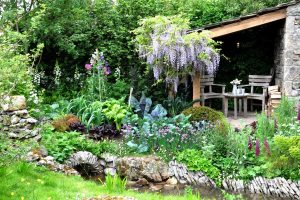Do you dream of having fresh herbs and vegetables at your fingertips, even if you have limited space? Well, the good news is that you don’t need a sprawling garden to grow your own edible treasures. With a little creativity and the expert guidance of Tony Harding Garden Adviser, you can transform even the smallest of spaces – be it a windowsill or a few pots – into a thriving herb and vegetable garden. In this blog post, we’ll explore how to make the most of your limited space and successfully grow your own delicious and nutritious produce. Let’s dig in!
1. Choose the Right Herbs and Vegetables: When space is limited, it’s essential to choose herbs and vegetables that are well-suited for container gardening. Opt for compact varieties that don’t require extensive root systems. Herbs like basil, thyme, and parsley are excellent choices, as are vegetables like lettuce, radishes, and cherry tomatoes. Consider your preferences and the amount of sunlight your space receives when making your selections.
2. Provide Adequate Sunlight: Most herbs and vegetables require at least six hours of direct sunlight each day to thrive. Place your pots or window boxes in a location that receives ample sunlight. If sunlight is limited, consider investing in a grow light to supplement natural light and ensure your plants receive the energy they need to grow. Remember to rotate your containers regularly to promote even growth and prevent your plants from leaning towards the light.
3. Choose the Right Containers: Selecting the right containers is crucial for small-space gardening success. Opt for pots or window boxes that are large enough to accommodate the root systems of your chosen herbs and vegetables. Ensure the containers have drainage holes to prevent waterlogged soil. If using a windowsill, place saucers underneath the pots to catch excess water and protect your windowsill from moisture damage.
4. Use Quality Soil and Proper Watering Techniques: Use a high-quality potting mix specifically formulated for container gardening. This type of soil retains moisture while providing adequate drainage. Water your herbs and vegetables thoroughly when the top inch of soil feels dry. Avoid overwatering, as this can lead to root rot. Remember to water the plants at the base to prevent water from sitting on the foliage, which can promote disease.
5. Regular Feeding and Maintenance: To keep your herbs and vegetables healthy and productive, regular feeding is essential. Use a balanced organic fertilizer or incorporate compost into the soil every few weeks to provide necessary nutrients. Regularly inspect your plants for pests or signs of disease, removing any damaged leaves or treating affected areas promptly. Harvest your herbs and vegetables regularly to encourage new growth and enjoy the fruits of your labor.
Growing your own herbs and vegetables in a small space is an achievable and rewarding endeavor. By carefully selecting the right plants, providing adequate sunlight, choosing suitable containers, using quality soil, and practicing proper watering and feeding techniques, you can enjoy a bountiful harvest right at your fingertips. Remember, no space is too small to create your own edible garden. For further guidance and personalized advice, consider reaching out to Tony Harding Garden Adviser. Happy gardening and enjoy the satisfaction of growing your own herbs and vegetables, no matter the size of your space!
As you embark on your journey to create a mini kitchen garden, don’t hesitate to seek the correct advice. With his 40 years of gardening experience, Tony can help you navigate the intricacies of plant care, ensuring your vegetables & herbs reach their full potential. If you require a consultation to optimize your gardening skills, or want to organise a captivating presentation to educate and inspire your social group, or an interactive workshop to enhance your gardening skills, Tony is ready to assist you. Get in touch today to learn more and take the first step towards unlocking the true beauty of growing your own! Your garden and tastebuds will thank you!



